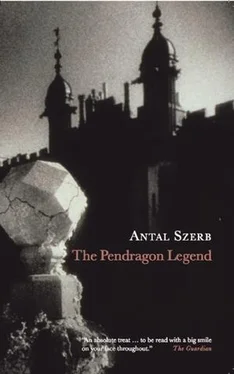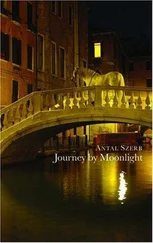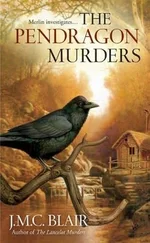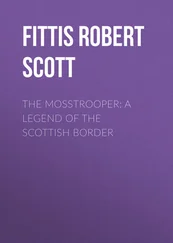We drove on, but only for a few yards. Then he turned off the road, first into a field, and then slowly back, bucking and bouncing, the way we had come. Finally we stopped again.
“I’m sorry about this little delay,” he said, and got out again.
The part of the field in which we had parked was separated from the main road by a hedge. The Earl stood behind it, very tense, watching the carriageway.
In the damp west wind, the place was bleak and uninviting. Here or there, in the dark, a clump of trees or the fantastic outline of a bush could be made out. It was the sort of field you find yourself in in a nightmare, with snakes coming at you from every direction.
What can a man do at such a time? Light a cigarette.
But I had hardly taken a puff before the Earl came dashing over to ask me not to smoke for a minute or two. With a pang, I threw the cigarette down.
Gradually I began to hear what he was listening for. It was a dull, rhythmic thudding. Of course: horses’ hooves.
At the same time something was approaching, very rapidly. I say something, because it wasn’t horsemen, it was some sort of thick fog, bowling along at terrifying speed down the middle of the road, as if driven by a gale or the chariot of Satan himself, and billowing out on either side like the smoke from a runaway train.
Moments later the fog reached and engulfed us. It was only then that I realised it wasn’t fog but a suffocating smoke that made me feel dizzy, and whose odour reminded me of incense.
From inside the car I could no longer see as far as the hedge, where the Earl had been standing. In that strange obscurity I wasn’t even sure if he was still there — or whether he was anywhere at all.
I jumped down and made my way as quickly as I could through the dense blackness to where I supposed he might be. Eventually my outstretched hands came up against the low, thorny branches.
I froze in my tracks.
The sound of galloping hooves was now almost upon me, and then, with astonished eyes, I seemed to see a horseman flying past, at breakneck speed, down the highway.
Then the fog was gone.
The moon came out, revealing the last billows disappearing rapidly down the road.
“So,” I said to myself, “the Rosicrucians’ claim to invisibility was only half true.”
The Earl was back at the wheel, sitting with his head in his hands. I dared not accost him. I climbed in, and he set off for Llanvygan.
At breakfast next morning I gave Cynthia a brief outline of what had happened. Naturally I avoided any mention of Eileen St Claire; nor did I tell her about Lenglet du Fresnoy’s vision (or whatever it might be termed). I also did not tell her I had encountered the midnight rider.
There are some things that are true only at night. There was no way I could have discussed them. I would have been ashamed to. One is ashamed of the incomprehensible, the irrational, as though it were a form of mental illness. I tried to avoid thinking about it.
Besides, it was such a perfect summer’s day. There was nothing but Cynthia in the world — Cynthia, and her little favourites, the farmstead piglets. We ambled up to the top of a hill, sat ourselves down and basked in the sun.
When silent, she was a vision of beauty. Sitting there on the brow of the hill overlooking the farm, in the clear Welsh sunlight with the towers of Llanvygan in the background, she was the fulfilment of everything I saw in imagination, and loved: the Lady of the Castle, innocent and remote from the cares of man. Only piglets, chickens and mighty oak trees can understand the touching, faintly comical yet utterly sublime mystery of young womanhood — when the young woman is well-to-do. A girl who is poor is never young in quite the same way: the seriousness of her daily cares makes her more like a man.
With her fair hair glistening in the sun, Cynthia had the silent beauty of a line of Theocritus. It was that special, brief moment of summer when you could believe time stood still and all was well with the world.
It seemed she had given herself up to the pleasure of sunshine on skin and the well-being of the body, and that there was nothing going on in her head. I felt supremely at ease myself.
She sat up, rather anxiously, and announced:
“You mustn’t get the idea I’m not thinking about anything. I can’t abide girls who just live for the moment.”
“And what are you thinking about, Cynthia?”
“I read in the morning paper that the number of unemployed in South Wales has risen by another five per cent. It’s dreadful to think that here we are, sitting on this hill, and all the time … ”
“That’ll do,” I cried, rather rudely.
It was as if she’d poured a bucket of cold water over my head. I can tolerate any form of sentimentality better than the bogus sympathy of the rich for the poor. It’s every bit as unnatural and offensive as a manual worker denying that he envies the boss’s wealth. Let the classes carry on with their mutual hatred — it’s the proper order of things — and leave me at peace in the sunshine: it happens so rarely in these islands.
“Oh, Cynthia! … ”
But there were two Cynthias. The words she had just uttered were not at all in harmony with the person I saw in her.
The Cynthia of my imagination was the sort of girl who, on the one hand, would swoon if she caught her beloved devouring a hot dog, but, if the need arose, would be capable of giving her maid a thrashing. She was the Lady of the Castle, proudly enthroned in her fairytale tower, blissfully ignorant of entire nations dying of hunger.
I had not yet abandoned the hope that Cynthia really was the person I believed her to be, it was just that she hadn’t been brought up properly. No doubt her mother was to blame. Under the influence of who knows what disappointments of her own, her mother must have dunned into her the great middle class myth that intellect mattered, and that every one was equally human.
“Cynthia, let the poor feel sorry for the poor. You should be proud and pitiless. If I were in your place … my whole life would be an unending parade of low-level sadism. It would be a byword for nonchalance and aloofness. I would never once take up a book, not even by accident. I’d fill my days with golf, or, if there is some sport even more exclusive and boring, I’d go in for that. I’d travel. I’d visit galleries and decide that Leonardo painted rather well considering he was so common. I would say very little: pride is so much more easily expressed through noble gestures. I don’t suggest it would be very amusing, but to do one’s duty never is.”
“Would you really change places with me?”
“Would I? This minute.”
“I really don’t understand you. I’d so much rather be in your position. To devote one’s life to scholarship … to truth, and the service of mankind … ”
“You may rest assured that my personal scholarship has never served mankind. Because there is no such thing as justice, no universal humanity. There are only versions of justice and different sorts of people. And it has always given me particular pleasure that my own scholarly efforts, let’s say, in the field of old English ironworking, have never been of the slightest use to anyone.”
“You speak like someone who has no ideals.”
“True. I am a neo-frivolist.”
“And how does that differ from old-fashioned frivolity?”
“Mostly in the ‘neo’ prefix. It makes it more interesting.”
She was making a childish wreath from some yellow flowers called dandelions in English, and staring despondently into the distance. Our intimacy had come to a critical moment. I now bitterly regretted having said so much. What is the point of talking to the woman you love? It can only cause unpleasantness.
Читать дальше












